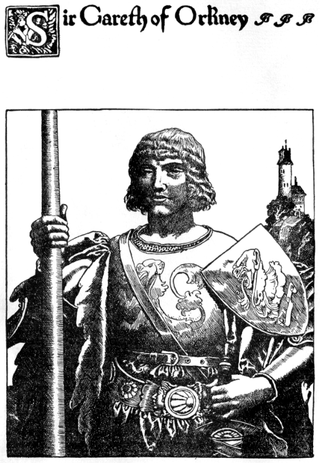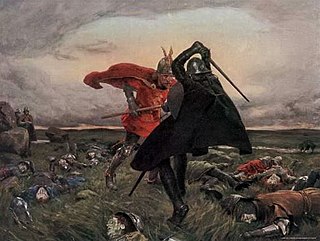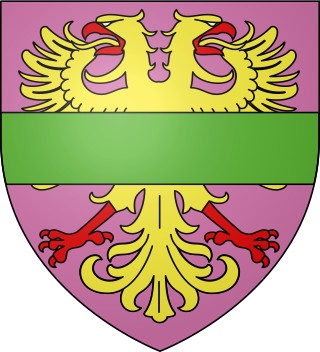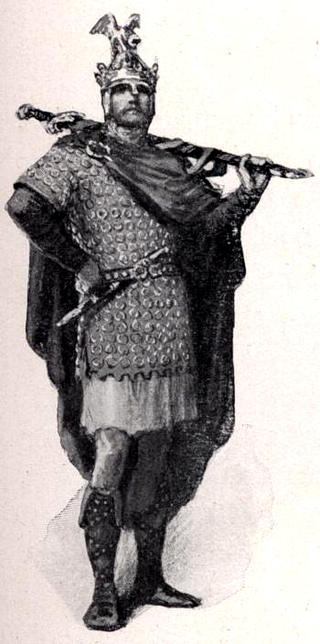
Gwyn ap Nudd is a Welsh mythological figure, the king of the Tylwyth Teg or "fair folk" and ruler of the Welsh Otherworld, Annwn, and whose name means “Gwyn, son of Nudd”. Described later on as a great warrior with a "blackened face", Gwyn is intimately associated with the otherworld in medieval Welsh literature, and is associated with the international tradition of the Wild Hunt.
Taliesin was an early Brittonic poet of Sub-Roman Britain whose work has possibly survived in a Middle Welsh manuscript, the Book of Taliesin. Taliesin was a renowned bard who is believed to have sung at the courts of at least three kings.

Guinevere, also often written in Modern English as Guenevere or Guenever, was, according to Arthurian legend, an early-medieval queen of Great Britain and the wife of King Arthur. First mentioned in popular literature in the early 12th century, nearly 700 years after the purported times of Arthur, Guinevere has since been portrayed as everything from a fatally flawed, villainous and opportunistic traitor to a noble and virtuous lady. Many records of the legend also feature the variably recounted story of her abduction and rescue as a major part of the tale.

Gawain, also known in many other forms and spellings, is a character in Arthurian legend, in which he is King Arthur's nephew and a Knight of the Round Table. The prototype of Gawain is mentioned under the name Gwalchmei in the earliest Welsh sources. He has subsequently appeared in many Arthurian tales in Welsh, Latin, French, English, Scottish, Dutch, German, Spanish, and Italian, notably as the protagonist of the Middle English poem Sir Gawain and the Green Knight. Other works featuring Gawain as their central character include De Ortu Waluuanii, Diu Crône, Ywain and Gawain, Golagros and Gawane, Sir Gawain and the Carle of Carlisle, L'âtre périlleux, La Mule sans frein, La Vengeance Raguidel, Le Chevalier à l'épée, Le Livre d'Artus, The Awntyrs off Arthure, The Greene Knight, and The Weddynge of Syr Gawen and Dame Ragnell.

Lancelot du Lac, also written as Launcelot and other variants, is a character in some versions of Arthurian legend where he is typically depicted as King Arthur's close companion and one of the greatest Knights of the Round Table. In the French-inspired Arthurian chivalric romance tradition, Lancelot is an orphaned son of King Ban of the lost kingdom of Benoic, raised in a fairy realm by the Lady of the Lake. A hero of many battles, quests and tournaments, and famed as a nearly unrivalled swordsman and jouster, Lancelot becomes the lord of the castle Joyous Gard and personal champion of Arthur's wife, Queen Guinevere, despite suffering from frequent and sometimes prolonged fits of madness. But when his adulterous affair with Guinevere is discovered, it causes a civil war that, once exploited by Mordred, brings an end to Arthur's kingdom.

Mordred or Modred is a figure in the legend of King Arthur. The earliest known mention of a possibly historical Medraut is in the Welsh chronicle Annales Cambriae, wherein he and Arthur are ambiguously associated with the Battle of Camlann in a brief entry for the year 537. Medraut's figure seemed to have been regarded positively in the early Welsh tradition and may have been related to that of Arthur's son.

The Knights of the Round Table are the legendary knights of the fellowship of King Arthur that first appeared in the Matter of Britain literature in the mid-12th century. The Knights are an order dedicated to ensuring the peace of Arthur's kingdom following an early warring period, entrusted in later years to undergo a mystical quest for the Holy Grail. The Round Table at which they meet is a symbol of the equality of its members, who range from sovereign royals to minor nobles.

Bedivere is one of the earliest characters to be featured in the legend of King Arthur, originally described in several Welsh texts as the one-handed great warrior named Bedwyr Bedrydant. Arthurian chivalric romances, inspired by his portrayal in the chronicle Historia Regum Britanniae, portray Bedivere as a Knight of the Round Table of King Arthur who serves as Arthur's marshal and is frequently associated with his brother Lucan and his cousin Griflet as well as with Kay. In the English versions, Bedivere notably assumes Griflet's hitherto traditional role from French romances as the one who eventually returns Excalibur to the Lady of the Lake after Arthur's last battle.
The Queen of Orkney, today best known as Morgause and also known as Morgawse and other spellings and names, is a character in Arthurian legend in which she is the mother of Gawain and Mordred, both key players in the story of King Arthur and his downfall. In early texts, Mordred's father is her husband, King Lot of Orkney, with whom she may also have various other children. In later versions, including the seminal Le Morte d'Arthur, Mordred is the offspring of Arthur's accidental incest with Morgause, his estranged half-sister. There, she is furthermore a sister of Morgan le Fay, as well as the mother of Gareth, Agravain, and Gaheris, the last of whom murders her.

Gareth is a Knight of the Round Table in Arthurian legend. He is the youngest son of King Lot and Queen Morgause, King Arthur's half-sister, thus making him Arthur's nephew, as well as brother to Gawain, Agravain and Gaheris, and either a brother or half-brother of Mordred. Gareth is particularly notable in Le Morte d'Arthur, where one of its eight books is named after and largely dedicated to him, and in which he is also known by his nickname Beaumains.

The Battle of Camlann is the legendary final battle of King Arthur, in which Arthur either died or was fatally wounded while fighting either with or against Mordred, who also perished. The original legend of Camlann, inspired by a purportedly historical event said to have taken place in the early 6th-century Britain, appears only in vague mentions found in several medieval Welsh texts dating since around the 10th century. The battle's much more detailed depictions have emerged since the 12th century, generally based on that of a catastrophic conflict described in the pseudo-chronicle Historia Regum Britanniae. The further greatly embellished variants originate from the later French chivalric romance tradition, in which it became known as the Battle of Salisbury, and include the 15th-century telling in Le Morte d'Arthur that remains popular today.

Welsh mythology consists of both folk traditions developed in Wales, and traditions developed by the Celtic Britons elsewhere before the end of the first millennium. As in most of the predominantly oral societies Celtic mythology and history were recorded orally by specialists such as druids. This oral record has been lost or altered as a result of outside contact and invasion over the years. Much of this altered mythology and history is preserved in medieval Welsh manuscripts, which include the Red Book of Hergest, the White Book of Rhydderch, the Book of Aneirin and the Book of Taliesin. Other works connected to Welsh mythology include the ninth-century Latin historical compilation Historia Brittonum and Geoffrey of Monmouth's twelfth-century Latin chronicle Historia Regum Britanniae, as well as later folklore, such as the materials collected in The Welsh Fairy Book by William Jenkyn Thomas (1908).

Gaheris is a Knight of the Round Table in the chivalric romance tradition of Arthurian legend. A nephew of King Arthur, Gaheris is the third son of Arthur's sister or half-sister Morgause and her husband Lot, King of Orkney and Lothian. He is the younger brother of Gawain and Agravain, the older brother of Gareth, and half-brother of Mordred. His figure may have been originally derived from that of a brother of Gawain in the early Welsh tradition, and then later split into a separate character of another brother, today best known as Gareth. German poetry also described him as Gawain's cousin instead of brother.

Sir Agravain is a Knight of the Round Table in Arthurian legend, whose first known appearance is in the works of Chrétien de Troyes. He is the second eldest son of King Lot of Orkney with one of King Arthur's sisters known as Anna or Morgause, thus nephew of King Arthur, and brother to Sir Gawain, Gaheris, and Gareth, as well as half-brother to Mordred. Agravain secretly makes attempts on the life of his hated brother Gaheris since the Vulgate Cycle, participates in the slayings of Lamorak and Palamedes in the Post-Vulgate Cycle, and murders Dinadan in the Prose Tristan. In the French prose cycle tradition included in Thomas Malory's Le Morte d'Arthur, together with Mordred, he then plays a leading role by exposing his aunt Guinevere's affair with Lancelot, which leads to his death at Lancelot's hand.

Sir Ywain, also known as Yvain and Owain among other spellings, is a Knight of the Round Table in Arthurian legend, wherein he is often the son of King Urien of Gorre and either the enchantress Modron or the sorceress Morgan le Fay. The historical Owain mab Urien, on whom the literary character is based, was the king of Rheged in Great Britain during the late 6th century.
The Battle of Arfderydd was fought in medieval Britain in AD 573, according to the Annales Cambriae. The opposing armies are identified in a number of Old Welsh sources but vary between them, perhaps suggesting several allied armies were involved. The main adversaries appear to have been Gwenddoleu ap Ceidio and either the princely brothers Peredur and Gwrgi or King Rhydderch Hael of Strathclyde. Gwenddoleu was defeated and killed in the battle. His bard, Myrddin Wyllt, reportedly went mad and ran into the forest. He is one of several proposed origins for the Arthurian character Merlin. The Welsh Triads refer to this battle as one of the "Three Futile Battles of the Island of Britain", along with the Battle of Camlann and the Battle of the Trees.

Hawk of May is the first installment in Gillian Bradshaw’s Down The Long Wind trilogy. Published initially in 1980 by Simon and Schuster, Hawk of May is a bildungsroman set in the time of King Arthur and centered on Gwalchmai ap Lot.

In Winter's Shadow is the final book in a trilogy of fantasy novels written by Gillian Bradshaw. It tells the story of King Arthur's downfall, as recounted by his wife Gwynhwyfar.

King Arthur's family grew throughout the centuries with King Arthur's legend. Many of the legendary members of this mythical king's family became leading characters of mythical tales in their own right.
Amlawdd Wledig was a legendary king of sub-Roman Britain. The Welsh title [G]wledig, archaically Gwledic or Guletic and Latinised Guleticus, is defined as follows: "lord, king, prince, ruler; term applied to a number of early British rulers and princes who were prominent in the defence of Britain about the time of the Roman withdrawal; (possibly) commander of the native militia ".
















